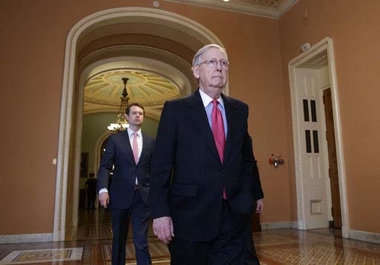Senate GOP 'goes nuclear,' clearing way for Trump court pick

WASHINGTON (AP) — Republicans invoked the "nuclear option" in the Senate Thursday, unilaterally rewriting the chamber's rules to allow President Donald Trump's nominee to ascend to the Supreme Court.
Furious Democrats objected until the end, but their efforts to block Judge Neil Gorsuch failed as expected. Lawmakers of both parties bemoaned the long-term implications for the Senate, the court and the country.
"We will sadly point to today as a turning point in the history of the Senate and the Supreme Court," said Minority Leader Chuck Schumer of New York.
The maneuvering played out in an atmosphere of tension in the Senate chamber with most senators in their seats, a rare and theatrical occurrence.
First Democrats mounted a filibuster in an effort to block Gorsuch by denying him the 60 votes needed to advance to a final vote. Then Republican Majority Leader Mitch McConnell of Kentucky raised a point of order, suggesting that Supreme Court nominees should not be subjected to a 60-vote threshold but instead a simple majority in the 100-member Senate.
McConnell was overruled, but appealed the ruling. And on that he prevailed on a 52-48 party line vote. The 60-vote filibuster requirement on Supreme Court nominees was effectively gone, and with it the last vestige of bipartisanship on presidential nominees in an increasingly polarized Senate.
A final confirmation vote on Gorsuch is expected Friday and he could then be sworn in in time to take his seat on the court later this month and hear the final cases of the term.
The maneuvering played out with much hand-wringing from all sides about the future of the Senate, as well as unusually bitter accusations and counter-accusations as each side blamed the other. The rules change is known as the "nuclear option" because of its far-reaching implications.
McConnell accused Democrats of forcing his hand by trying to filibuster a highly qualified nominee in Gorsuch, 49, a 10-year veteran of the 10th U.S. Circuit Court of Appeals in Denver with a consistently conservative record. McConnell vowed that the rules change would block the Gorsuch filibuster, and all future ones, a change many lawmakers lamented could lead to an even more polarized Senate, court and country.
"This will be the first, and last, partisan filibuster of a Supreme Court nominee," McConnell declared. "This is the latest escalation in the left's never-ending judicial war, the most audacious yet, and it cannot and will not stand."
Supreme Court filibusters have been nearly unheard of in the Senate, but the confrontation is playing out amid an explosive political atmosphere with liberal Democrats furious over the Trump presidency and Republicans desperate to get a win after months of chaos from Trump.
Democrats also remain livid over McConnell's decision last year to deny consideration to then-President Barack Obama's Supreme Court nominee, Judge Merrick Garland, who was ignored for the better part of a year by Senate Republicans after the death of Justice Antonin Scalia. Instead, McConnell kept Scalia's seat open, a calculation that is now paying off hugely for Republicans and Trump, who will be able to claim the biggest victory of his presidency to date if Gorsuch is confirmed as expected.
"We believe that what Republicans did to Merrick Garland was worse than a filibuster," Schumer said. "We didn't hear two words in the long speech of Senator McConnell: Merrick Garland."
Emotions were running high ahead of the votes with raised voices on the floor where proceedings are normally sedate. All involved were keenly aware of the long-term implications of the proceedings, some of them hard to predict for the future of Trump's presidency and the 2018 midterm elections, when Republicans will be defending their slim 52-48 Senate majority and 10 vulnerable Democrats in states Trump won will be up for re-election.
Senators on both sides of the aisle lamented the trajectory they were on toward the Senate rules change, though they themselves were in position to prevent it from happening and failed to do so.
Moderate Republican Sen. Susan Collins of Maine said roughly 10 senators of both parties worked over the weekend to come up with a deal to stave off the so-called "nuclear option," as the rules change is known, but couldn't come to agreement. In 2005, a bipartisan deal headed off GOP plans to remove the filibuster barrier for lower-court nominees, but in 2013 Democrats took the step, leaving the filibuster in place only for Supreme Court justices.
And now it too is gone. For now the filibuster barrier on legislation will remain, though many fear it could be the next to go.
"I fear that someday we will regret what we are about to do. In fact, I am confident we will," said Sen. John McCain, R-Ariz. "It is imperative we have a functioning Senate where the rights of the minority are protected regardless of which party is in power at the time."
Nonetheless, McCain voted with McConnell on the rules change, saying he felt he had no choice.
Gorsuch now counts 55 supporters in the Senate: the 52 Republicans, along with three moderate Democrats from states that Trump won last November — Joe Manchin of West Virginia, Heidi Heitkamp of North Dakota and Joe Donnelly of Indiana. A fourth Senate Democrat, Michael Bennet from Gorsuch's home state of Colorado, has said he will not join in the filibuster against Gorsuch but has not said how he will vote on confirmation.
___
By Erica Werner, Mark Sherman, and Mary Clare Jalonick. Copyright Associated Press.
The Gayly - 4/6/2017 @ 12:44 p.m. CST





